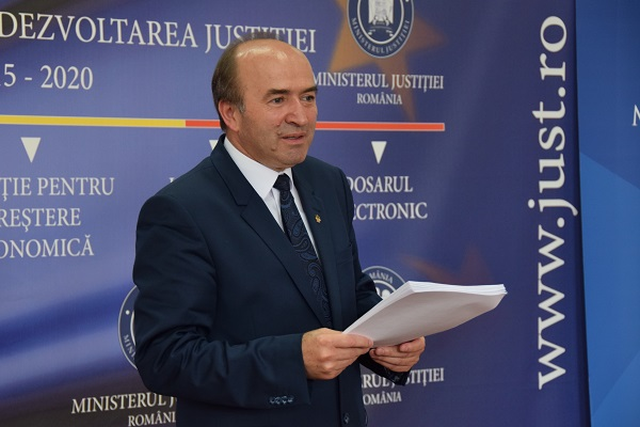Reactions to the proposed amendments to the justice laws
Controversy rises as the Superior Council of Magistracy gave a negative opinion on Tudorel Toader's bill amending the justice laws

Bogdan Matei, 29.09.2017, 13:29
As expected by the media, the Superior Council of Magistracy on Thursday gave a negative opinion on a bill to amend the justice laws proposed by the Justice Minister Tudorel Toader. What came as a surprise for many commentators, however, is the tight result of the vote in the Council, which indicates deep divisions among its members. Ten of them voted in favour of a negative opinion and eight for a positive opinion, albeit with some observations.
The objections of those who voted against are essentially related to several controversial proposals in the bill. These include the transfer of the Judicial Inspectorate under the control of the justice ministry, the elimination of the president from the procedure to appoint the chief prosecutors of the anticorruption and antimafia prosecutor offices, the interdiction to become a magistrate for legal professionals under the age of 30 and the creation of a specialised directorate to prosecute magistrates who commit crimes. The eight Council members who stood for a positive opinion blame the majority for hindering reform.
Minister Toader, who did not attend the meeting of the Superior Council of Magistracy saying he did not wish to influence debates, later said some people do not want to reform the system, which must be brought within what he called the parameters of constitutionality. He also said he was convinced that the negative opinion also reflected a wish to maintain the current privileges enjoyed by magistrates. The Association of Magistrates in Romania has also criticised the negative opinion issued by the Council. The Association writes in a press release that under the circumstances, the viewpoints sent to the Council from around the country could no longer be supported before the lawmaker.
President Klaus Iohannis, on the other hand, said, through his spokesman, that the Councils opinion, despite being only advisory, cannot be ignored by the government and Parliament. Speaking on behalf of the biggest party in the right-wing opposition, the leader of the National Liberal Party Ludovic Orban said the government should give up on all provisions in the bill in question, which he said limit the independence of the judiciary. The media and civic organisations view the vote in the Council as rather good news. They reflect the lack of confidence of a significant section of Romanian society in a government suspected of wishing to seize control of the judiciary and put the break on the fight against corruption.
At the beginning of the year, an attempt by the government to amend the criminal codes through an emergency order triggered the biggest street protests in post-communist Romania. In Bucharest and around the country as well in the Diaspora, hundreds of thousands of people took to the streets blaming the government for trying to exempt from criminal accountability influential people from the world of politics and the administration accused of corruption. (Translated by C. Mateescu)






























